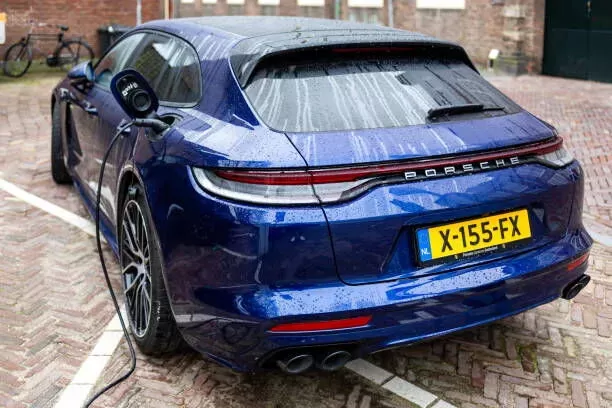Notifications

9 minutes, 9 seconds
-138 Views 0 Comments 0 Likes 0 Reviews

Topper Company, a professional EV charger manufacturer in China, provides reliable electric vehicle charging station equipment and comprehensive total solutions.
Electric vehicles (EVs) are no longer a novelty—they're a rapidly growing part of everyday transportation. As the world embraces cleaner, more sustainable energy, more drivers are switching to EVs for both daily commutes and long-distance travel. But with the rise of electric mobility comes a common question from new owners: Can I safely charge my electric car in the rain?
It’s a fair concern. After all, electricity and water don’t typically mix. But the reality is reassuring: modern EV chargers are specifically designed to be weatherproof and safe for outdoor use—even in heavy rain. With the right equipment and proper installation, charging your EV outside is not only safe but also highly convenient.
In this guide, we’ll explore how waterproof EV chargers work, what IP ratings like IP65 and IP67 really mean, why installation location matters, and how companies like Topper are leading the way in safe, all-weather charging solutions.
Home charging offers more than convenience—it delivers control, cost savings, and long-term reliability. Unlike public stations that may charge premium rates during peak hours, residential chargers allow EV owners to charge overnight at lower energy rates and on their schedule.
Topper’s range of weatherproof home EV chargers is built for outdoor installation. With rugged enclosures, smart safety features, and tamper-resistant design, they offer worry-free charging whether it’s raining, snowing, or blazing hot.
Yes—charging an EV in the rain is completely safe, provided the charger and vehicle are functioning correctly and meet certified safety standards.
Modern EV chargers are engineered for real-world conditions. From rain and snow to dust and temperature fluctuations, every component—from the enclosure to the cable—is designed and tested for durability. Importantly, both the EV and the charger are equipped with intelligent safety protocols that prevent electricity from flowing until a secure connection is made—ensuring no shock risk, even in wet weather.
Ingress Protection (IP) ratings, defined by the International Electrotechnical Commission (IEC), classify how well electrical enclosures block out solids and liquids.
IP65: Fully protected against dust and resistant to low-pressure water jets—ideal for general outdoor use.
IP66: Offers greater protection against powerful water jets and fine particles—great for harsher environments.
IP67: Can withstand temporary immersion in water (up to 1 meter for 30 minutes)—ideal for flood-prone or low-lying areas.
A charger rated IP65 or higher is suitable for year-round outdoor use, even in heavy rain. Be sure to check the IP rating when selecting a charger for outdoor installation.
Waterproof EV chargers are designed with multiple safety systems to ensure consistent, risk-free operation:
Sealed, Water-Resistant Connectors
Special rubber seals protect charging pins from moisture, preventing corrosion and maintaining a secure electrical connection.
Durable, UV-Resistant Enclosures
Chargers use impact-resistant, weatherproof materials to protect internal components from rain, dust, sun, and temperature extremes.
Smart Charging Communication
Power only flows when the EV and charger confirm a safe connection, preventing electrical arcing or premature activation.
RCD (Residual Current Devices)
These instantly shut off the power if any current leakage is detected—preventing shock or short-circuiting.
Thermal Protection
Temperature sensors automatically halt charging if excessive heat is detected, protecting both the charger and the EV.
Even with waterproof equipment, proper placement is critical. Avoid installing chargers in areas where water may pool, flood, or freeze.
Wall-mount under a carport or awning: Adds extra protection from the elements.
Pedestal-mounted with drainage design: Ideal for open driveways or commercial lots.
Elevated from ground level: Prevents splashback and cable submersion.
Topper provides installation support to ensure chargers are positioned for both safety and long-term performance.
Before reaching the market, EV chargers undergo extensive durability testing to validate their resistance to environmental factors:
Water Ingress Testing: Simulates rain and water jets from all directions.
Submersion Testing (IP67): Units are immersed in water tanks for 30 minutes to test seal integrity.
Dust Chamber Testing: Replicates real-world exposure to sand and debris.
UV and Temperature Cycling: Ensures resistance to sun damage and extreme weather.
Mechanical Impact Testing: Verifies physical durability in high-traffic environments.
Only chargers that pass these rigorous tests and obtain certifications like UL, CE, or TUV are approved for safe public or residential use.
Weatherproof: Built to resist rain, dust, and sunlight—suitable for standard outdoor use.
Waterproof: Designed to prevent water ingress even under temporary submersion—ideal for flood-prone or harsh environments.
For most homes, weatherproof chargers rated IP65 or higher are more than sufficient. In coastal or low-lying areas, consider upgrading to IP67 models for added protection.
Today’s EV chargers go beyond hardware with integrated smart features for safety and convenience:
Live charging status and fault alerts
Remote control via mobile app
Scheduled charging to avoid peak hours
Notifications for power interruptions or thermal events
Topper chargers support remote monitoring, firmware updates, and OCPP 1.6/2.0.1 communication protocols—ensuring you stay informed and in control, rain or shine.
Topper’s waterproof EV chargers are designed with safety and resilience in mind. Rated up to IP67, they are built to endure harsh conditions and ensure safe operation all year long. Our chargers undergo strict quality control and environmental testing, and are backed by international certifications.
From hardware to software, Topper is committed to delivering safe, user-friendly charging solutions for homes, businesses, and public infrastructure.
As EV adoption accelerates, having a reliable, waterproof charger is no longer optional—it’s essential. Thanks to advanced materials, smart design, and rigorous safety standards, charging your EV in the rain is safe, simple, and stress-free.
By understanding IP ratings, choosing certified products, and ensuring proper installation, you can protect your investment and charge confidently in any weather. And with trusted solutions from manufacturers like Topper, you're not just getting a charger—you're getting peace of mind.Know more about Google SEO Directory
China EV Chargers EV Charger Manufacturer EV Charging Solutions

